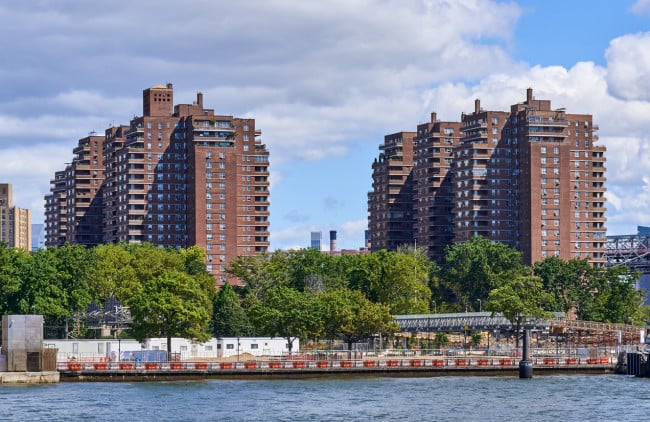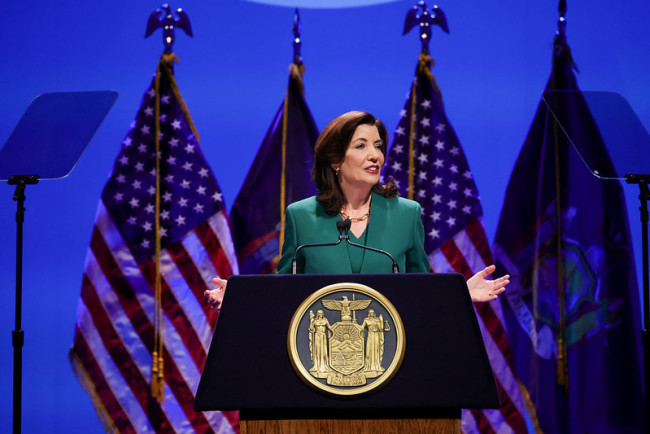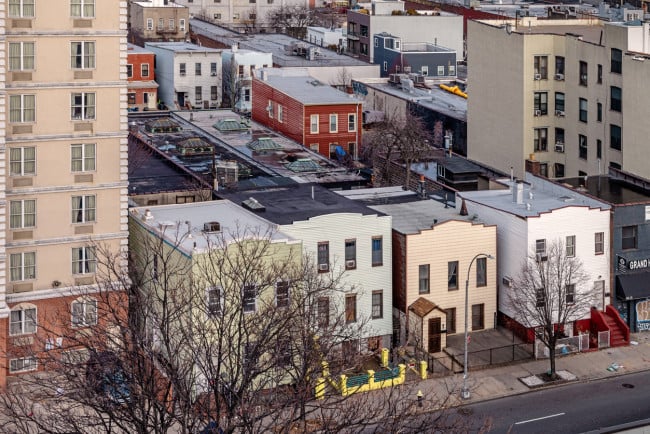New York state budget greenlights more condo conversions, new housing vouchers, but no down payment assistance
- Newly passed legislation would make it easier for newer, large rental buildings to go condo
- The budget secured $50 million for a new statewide Housing Access Voucher pilot program
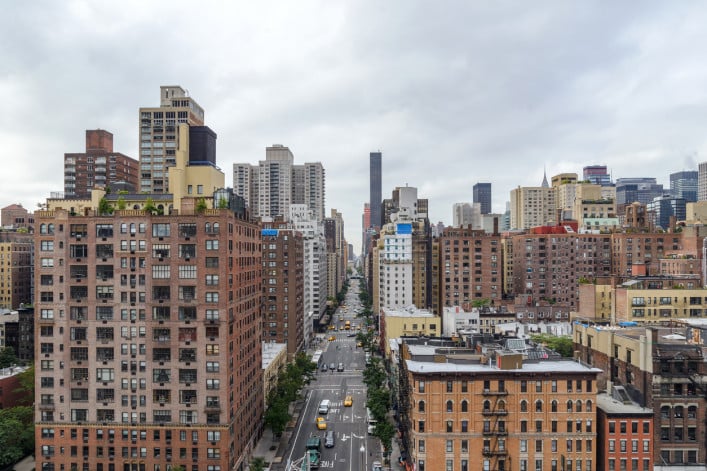
The budget also includes $1 billion for City of Yes for Housing Opportunity, NYC's landmark initiative to build 80,000 units of housing in the next 15 years.
iStock
Some New York City renters could gain a path to buying their apartments under legislation passed in the whopping $254 billion New York state budget last month.
The budget lowers the number of renters or would-be-buyers that would need to agree to convert some newer, large apartment buildings from rental to condo. It’s one of a handful of initiatives—including a new statewide housing voucher program—that could have major impacts on NYC housing in the coming years.
The budget includes some big wins for owners and would-be-buyers: it blocks large investors from buying single- and two-family homes for 90 days, funds a program that helps owners fight off scams and foreclosure, and provides $50 million in funding for the Housing Access Voucher Program (HAVP), which would subsidize rent for low-income, homeless New Yorkers or those at risk of homelessness.
But the budget does not include Governor Kathy Hochul’s proposed $50 million in funding to help would-be-buyers make a down payment, despite both the state legislature and assembly initially supporting the idea, New York Focus reported. Nor does the budget include a state ban on price-fixing software that sets rents for landlords—which Hochul pitched in January.
Read on for how the state budget impacts NYC’s renters and would-be-buyers.
| What’s in the budget? | What does it mean for buyers and renters? |
|---|---|
Easing rental-to-condo conversions through the Affordable Housing Retention Act | Landlords of newer, big rental buildings can convert those properties into condos if just 15 percent of tenants, or qualified buyers, agree to buy. Rent-stabilized residents will be permanently protected. |
A new Housing Access Voucher Program | With a $50 million pilot program, the budget funds a rental assistance program for New Yorkers at risk of, or experiencing, homelessness. The funding, however, is less than advocates hoped. |
A 90-day delay on large investor purchases of homes | Big investors must wait 90 days before bidding on a single- or two-family home, but nonprofits, land banks, and community land trusts are exempt. |
Funding for deed theft and scam prevention services | The budget included $40 million for the a program which funds 89 nonprofits statewide that advise owners on scams, deed theft, and more. |
What’s *not* in the budget? | What did the governor propose? |
|---|---|
$50 million in down payment assistance for New Yorkers | In January, Hochul proposed $50 million in new state funds for would-be-buyers struggling to make a down payment, but the proposal did not make it into the final budget. |
A state ban on rent-setting software | Hochul also pitched banning rent-setting software in her State of the State address in January that was not included in the budget. |
Easing condo conversions
Residents in large, newer apartment buildings across the city could vote to convert their rental buildings into condo buildings and buy their units, if just 15 percent of tenants or would-be buyers agree.
If that number sounds familiar, that’s because rental buildings could be converted into condos if 15 percent of tenants voted in favor of the move before 2019, when the Housing Stability and Tenant Protection Act raised the portion of tenants who had to agree from 15 percent to 51 percent. This law, the Affordable Housing Retention Act, brings back the old 15 percent margin for certain properties.
Still, most NYC buildings aren’t eligible to go condo under the new legislation. Eligible properties must have 100 or more units, built after 1996, and contain rent-stabilized apartments because the developer benefited from state or local tax breaks in exchange for those units. (Think the 421-a program or federal Low Income Housing Tax Credit program.)
Under the law, a non-profit would need to buy the building’s rent-stabilized units for a conversion to go forward, and those apartments would become permanently rent-stabilized. Or, regulated tenants could buy their units to create a limited equity housing cooperative, such as a Housing Development Fund Corporation, within the same building.
“For tenants that are living in those low income units, if the building is converted to condominium, those units would remain protected forever, so they would be able to stay in their home,” said Erica Buckley, a partner with Nixon Peabody who leads the law firm’s cooperative and condominium team.
If rent-stabilized tenants choose to create an HDFC within the condo building, both have to be managed by the same property management company, and all residents need to have equal access to the building’s amenities, Buckley added.
Any tenant who decides to buy would have an exclusive right to purchase their units for three months after any conversion plan is accepted by the State Attorney General’s office, which is charged with overseeing conversions under the law. Those who don’t buy within that window will have another six months after that to make a deal on the same terms of another purchaser who is in contract for the apartment.
And tenants who don’t buy their apartments can’t be evicted just because they didn’t sign on the dotted line. Elderly and disabled tenants, even those that don’t live in rent-stabilized apartments, also receive additional protections against eviction and rent increases under the law similar to those under the state’s new Good Cause eviction law.
Vouchers for those at risk or experiencing homelessness
The budget secures $50 million in funding for a housing voucher program that advocates intend to be a lifeline for homeless New Yorkers or those at risk of becoming homeless.
Homeless New Yorkers, or renters who have received an eviction notice, are living in hotels or motels, and even those who are forced to ditch their apartments because of an asbestos infestation are eligible for the Housing Access Voucher Program, which will help subsidize their rent regardless of their immigration status.
The budget allocates $50 million in funding for the first year of HAVP, with future years up for negotiation, City Limits reported. But that funding is just a fifth of the $250 million advocates hoped to secure over three years, which would have served roughly 13,760 households, according to New York University’s Furman Center estimate.
Based on some back-of-the-envelope calculations, that $50 million would serve just under 3,000 households.
“We want to make sure the program continues to grow, expands, and is further implemented,” said Logan Phares, political director of Open New York, a pro-development nonprofit. “This is a really important first step.”
HAVP is launching just as President Donald Trump’s administration proposes slashing federal housing programs, including Section 8, a subsidy that nearly 123,000 NYC households rely on to help pay their rent, according to the Furman Center. This spring, Section 8 payment delays rattled voucher holders, landlords, and advocates alike, and the latter warned that late payments and growing uncertainty over Section 8’s fate could worsen housing discrimination.
Bebhinn Francis, an organizer at United Tenants of Albany and a longtime campaigner for HAVP, said she feared those cuts will drive up homelessness across New York.
“I’m very concerned we're going to see eviction and homelessness rise between now and when this program is implemented,” Francis said. “But at least we have a safety net to look forward to,” Francis added, referring to HAVP.
No money for first-time buyers
New Yorkers hoping to score some cash to make a down payment will be disappointed by this year’s budget.
In January, Hochul proposed spending $50 million to create a statewide assistance program to help first-time buyers make a down payment. But her January pitch, which came with few details, didn’t make it into the finished budget.
“We need resources for down payment assistance,” said Kevin Wolfe, deputy director for advocacy and public affairs at the Center for New York City Neighborhoods. “It’s important, and we want to work on that in the next budget.”
Buyers can currently get up to $100,000 in a forgivable loan to buy their first condo, co-op, or one- to four-family house through the city’s HomeFirst program. But few New Yorkers are selected; HomeFirst provided loans to 1,149 New Yorkers in the past decade, though additional funding will serve another 1,000 first-time buyers over the next five years.
The budget also failed to ban software that sets rents for landlords, something Hochul pitched in her State of the State address in January. The U.S. Justice Department sued six of the country’s biggest landlords for allegedly colluding by using the software to artificially raise rents after a ProPublica investigation exposed the trend.
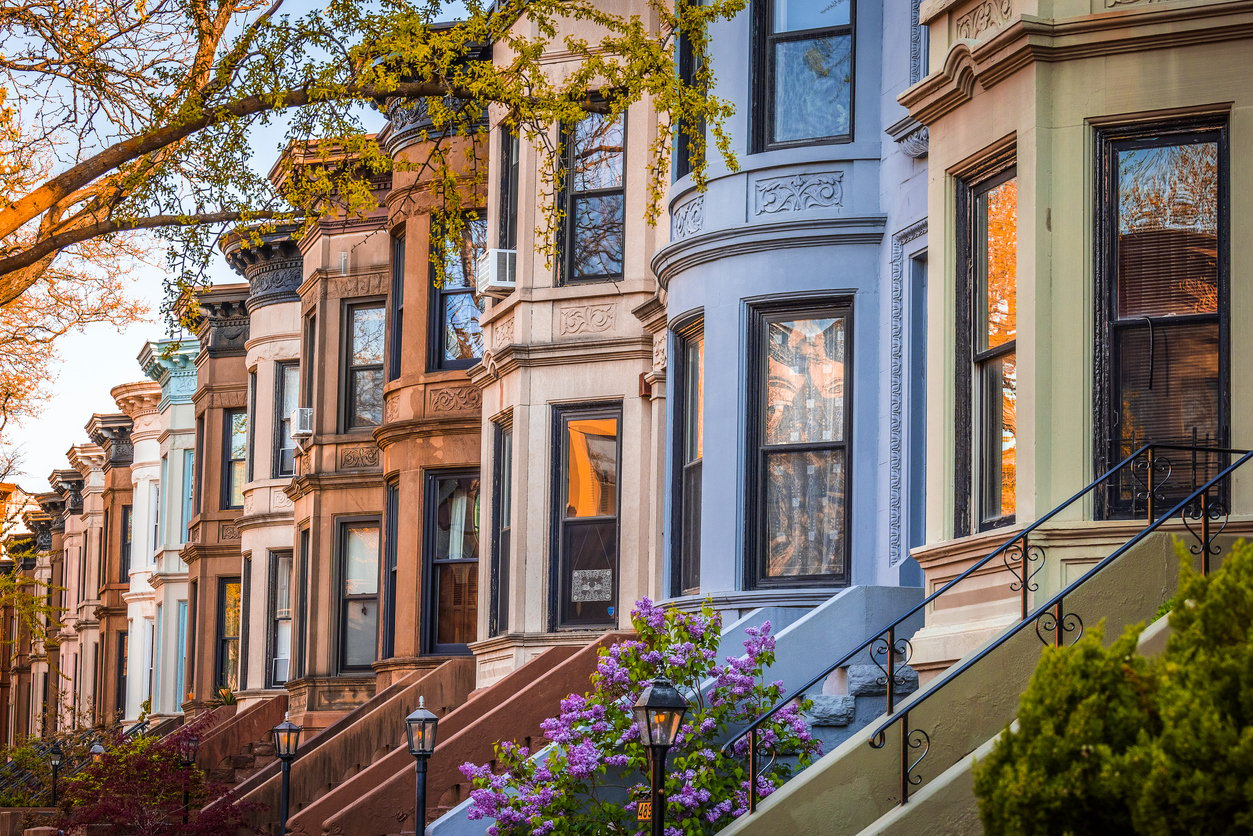
A delay on large investors
Big investors looking to scoop up some of New York’s one- and two-family houses will need to back off—for about three months—under new legislation enacted in the budget.
Investors who own 10 or more single- or two-family properties and have at least $30 million in assets under management will have to wait 90 days before they can make an offer on those types of properties. Nonprofits, land banks, and community land trusts are exempt from the rule.
Large investor-owners exacerbate “existing scarcity and [drive] up prices,” for would-be-buyers statewide, according to a press release from the governor’s office.
“That’s one of the things that’s putting pressure on affordability for first-time buyers,” Wolfe said. “This is a step in the right direction.”
Hochul originally proposed a 75-day waiting period for these purchases in her January State of the State address, but upped the timeline to 90 days in the final budget. But the legislation does have one notable carveout: houses sold in foreclosure are exempt from the new law, according to a press release.
Owners can still get help with scams
Owners behind on their real estate taxes, facing foreclosure, or dealing with a deed theft scam will still be able to get one-on-one help from a network of 89 nonprofits statewide funded by the Homeowner Protection Program, which scored $40 million in the budget.
“This is a tremendous win for the homeowners of New York state,” said Wolfe of CNYC, one of the partners that helps administer HOPP throughout the state. “By providing the $40 million in funding, the state is paying for the nonprofit attorneys to represent owners in court, to provide financial counselors to give advice for homeowners who may be in debt, and to help them get out of debt.” Wolfe said.
The funding is even more crucial today, Wolfe said, given the federal government’s cuts to offices that traditionally protect owners, such as a drastic 90 percent reduction for staffers at the Consumer Financial Protection Bureau.
Owners can also get assistance in getting their properties off the tax lien sale list. Private investors can purchase these liens, tack on high interest and fees, and go after owners for the inflated amount—even forcing them into foreclosure. Mayor Eric Adams’s administration is gearing up to hold a tax lien sale on June 2nd, and as of late March there were 21,372 residential properties on the list citywide.
If you’re a New York City resident who needs help, you can also call 311 and ask for the Homeowner Help Desk, a CNYCN program that assists residents in Central Brooklyn, Southeastern Queens, and the North Bronx. You can also get help from the HOPP website, Homeowner Help NY.
More money, more development
Last but not least, Governor Hochul dedicated a whopping $1 billion to the City of Yes for Housing Opportunity—a key commitment that helped get the landmark legislation passed last year.
The proposal aims to create over 80,000 new housing units in NYC over 15 years to address the affordable housing shortage. The legislation rolled back mandatory parking requirements and created new zoning districts to allow for taller towers that include affordable units.
The budget also secures $50 million to fund low-interest loans for developers to build housing outside NYC.


















